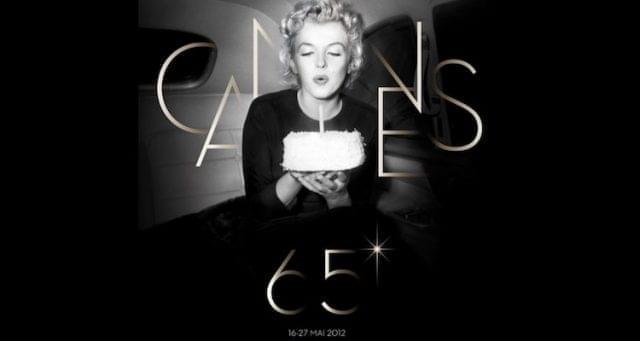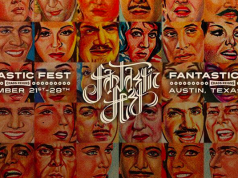
Bonjour, amigos! I was thrilled to attend the Cannes Film Festival for the first time this year, fulfilling a dream I’d had ever since I learned that you don’t pronounce the “s.” It’s not possible for any one human to see every movie playing at Cannes (especially when the human in question is lazy), but I did manage to catch 18 of them in the eight days I was there. Here’s a rundown, arranged in order from trés bon to trés mauvais.
The best Cannes film I saw was actually a holdover from Sundance: “Beasts of the Southern Wild” (here’s my review), a lyrical and poignant drama about a little girl living in the bayous of Louisiana. Having already won the Grand Jury Prize at Sundance, it won the Cannes prize for best first film and is destined to be one of the most talked-about indie films of 2012 when it opens theatrically on June 29. Watch for it. Grade: A-
Wes Anderson’s “Moonrise Kingdom” was Cannes’s opening night selection, marking the director’s first visit to the Palais des Festivals. (As a filmmaker, anyway. Maybe he’s been there as an audience member.) It’s playing in New York and Los Angeles now, and will expand to more theaters in the next couple weeks. My review is here. Grade: A-
“Reality,” by Cannes alumni Matteo Garrone (“Gomorrah”), offers a Fellini-esque satire of celebrity culture in the story of a man who wants desperately to become a star by being a “Big Brother” contestant. Oscilloscope Laboratories (the one founded by Beastie Boys’ Adam “MCA” Yauch) will distribute the film in the U.S., so you’ll be able to see it sometime this year. In the meantime, here’s my review. Grade: B+
One of France’s best contemporary directors, Jacques Audiard (“A Prophet”), returned to Cannes with “Rust and Bone,” an exceptionally well-acted drama about a brutal lout (Matthias Schoenaerts) and his strange relationship with a tragically injured orca-trainer (Marion Cotillard). Sony Classics will bring it to U.S. theaters. Did I write a review? I did. Grade: B+
“The Angels’ Share” comes to us from Ken Loach, the socially conscious British director whose “The Wind That Shakes the Barley” won the Palme d’Or in 2006. But “The Angels’ Share,” written by regular collaborator Paul Laverty, is much more lighthearted than the I.R.A.-based “Barley,” being concerned with nothing more than the exploits of some Glasgow delinquents who want to steal some very old, very valuable whisky. It’s the “Ocean’s Eleven” of whisky-heist movies! And what a charming, sweet-natured comedy it is! Robbie (Paul Brannigan), a young former hoodlum seeking to stay out of trouble so he can care for his girlfriend and newborn son, befriends some of the low-level criminals with whom he’s assigned to do community service. Their supervisor, a kindly, coach-like middle-aged man named Harry (John Henshaw), is a whisky aficionado, and he begins to share his expertise with Robbie and the crew, leading to a scheme to pilfer a few bottles’ worth from a recently discovered cask of rare booze about to be auctioned. (For the purposes of the film, stealing old whisky does not qualify as a “crime.”) Robbie and his pals — including dim-bulb Albert (Gary Maitland) and punk-girl Mo (Jasmine Riggins) — are a fun bunch of tart-tongued Scots, and watching their adventures is a pleasure. (Sundance Selects, a division of IFC Films, will distribute in the U.S.) Grade: B+
One thing you should know about me is that I love “Kill List,” a sinister, unsettling British thriller released in the U.K. last year and the U.S. this year. As off-the-rails as that movie gets, I love its audacity. Now its director, Ben Wheatley, has followed it up with “Sightseers,” a morbid comedy that’s less ambitious but perhaps more conventionally entertaining. (“Kill List” is dark, man.) Written by its stars, Alice Lowe and Steve Oram, both of whom had minor roles in “Kill List,” “Sightseers” is the story of a sheltered 34-year-old near-spinster named Tina who takes a camping vacation with her new boyfriend, Chris, whom her batty old mother doesn’t trust. It is revealed soon enough that Chris has some sociopathic tendencies; the question is whether this behavior will bring out similar instincts in the timid but eager-to-please Tina. What follows is pitch-black and funny, nearly as dismal as “Kill List” but played for laughs rather than horror. Lowe and Oram’s natural performances are authentic and un-showy, like two ordinary people who happen to get involved in some casual bloodshed. By stripping away the usual trappings of movies about psychos — no longwinded explanations of why anybody does what he does — Wheatley lets us simply revel in the consequence-free mayhem. (IFC has U.S. distribution rights.) Grade: B
“Amour” was this year’s Palme d’Or winner, a bit of a coup for writer-director Michael Haneke, whose “The White Ribbon” took top honors in 2009: six other filmmakers have won the Palme d’Or twice in their careers, but no one’s done it in such a short span of time. Strangely enough, “Amour” — by the man who made the controversial and unsettling “Funny Games,” “The Piano Teacher,” and “Cache” — was the “safe” choice this time, a film liked by most and loved by a few that didn’t bring any particular baggage with it. Don’t worry that Haneke has gone soft, though. His story of an elderly man (Jean-Louis Trintignant) caring for his beloved wife (Emmanuelle Riva) after a debilitating stroke is unnerving in its own way — heartfelt and tender, but with an undercurrent of foreboding. Haneke’s cold style of long takes and frequent silences forces us to spend a lot of time doing nothing with the old codgers, which the sympathetic performances make us happy to do. Though the film doesn’t have much emotional impact, it does have a way of burrowing into your head and making you worry about what you and your sweetheart will do when you get old. (Sony Classics will distribute in the U.S.) Grade: B
“Killing Them Softly,” starring Brad Pitt as an underworld enforcer called in after a mob-run poker game is robbed, is based on George V. Higgins’ 1974 novel “Cogan’s Trade.” But writer/director Andrew Dominik (“Chopper,” “The Assassination of Jesse James by the Coward Robert Ford”) has added something that makes it stand out from the run-of-the-mill Tarantino-ish crime drama it otherwise resembles: He’s set it against the backdrop of the 2008 financial collapse and the American presidential election that was happening at the same time. The actions of the movie’s criminals therefore become a commentary on how the U.S. responded to the economic crisis: punishing scapegoats in a public, message-sending manner while letting those at the top go free; doing little to prevent it from happening again; that sort of thing. As un-subtle as Dominik is, at least he doesn’t get too political, and “Killing Them Softly” works as a cool, unsavory blend of slow-motion bloodshed and amusingly vulgar gangster dialogue. (Opens theatrically Sept. 21.) Grade: B
As far as crowd-pleasing crime dramas about Prohibition-era bootleggers go, “Lawless” is a bloody good time. Yes, Shia LaBeouf plays the main character. Get over it. Tom Hardy is here, too, as are Guy Pearce, Jessica Chastain, and Gary Oldman. It opens theatrically on Aug. 31, just in time to keep Hardy’s momentum going after everyone loves him in “The Dark Knight Rises.” My review is here. Grade: B
Did you ever watch a David Cronenberg film like “Videodrome” or “Naked Lunch” or “The Fly” and wonder if the director’s son, Brandon Cronenberg, would grow up to be just as weird as his dad? “Antiviral” has your answer, and the answer is, “Eww, yes.” The 32-year-old junior Cronenberg’s debut feature is set in a sterile white metropolis in which the latest trend is being infected with the same diseases as your favorite celebrities. And not just the same disease, but the actual strain that your idol has, as if you it were passed straight from her mouth to yours. (Pharmaceutical companies strike deals with willing stars to take samples of their viruses and sell them to consumers.) Syd March (Caleb Landry Jones), a technician at one of the companies dealing in such things, gets involved in the black market; that’s when the plot goes a little stale, with corporate espionage and conspiracies and a hammy Malcolm McDowell. Cronenberg has created a creepy and compelling world, though, even if the story he tells in it doesn’t resonate. (No U.S. distributor yet, but it’s bound to get picked up by someone.) Grade: B-
Iranian filmmaker Abbas Kiarostami’s “Certified Copy,” starring Juliette Binoche and William Shimell, made waves in indie circles when it was released in the U.S. last year, showing up on a handful of top-10 lists and bringing the director to the attention of a lot of people who’d never heard of him. (He’s been making movies since 1970; “Certified Copy” was his 40th.) Riding on that wave of success, Kiarostami returned to Cannes with “Like Someone in Love,” a Japanese-language drama that plays on many of the same themes. A young college student who works part-time as an escort is dispatched to spend an evening with a wholesome old professor who is mistaken by the girl’s controlling boyfriend to be her grandfather. The intrigue (such as it is) of “Like Someone in Love” hinges, as did “Certified Copy’s,” on the uncertainty of identity: who are these people, and how are they connected to one another? My reaction was about the same, too: I’m enraptured by the slow-moving, methodical storytelling while it’s happening, but when it’s over I’m unsatisfied. I’m the quintessential rube who says “That’s it?” when the lights come up. Whatever is going on in these two films, it’s not for me. But my hunch is that those who loved “Certified Copy” will be somewhat less fond of “Like Someone in Love,” which feels like a less effective version of its predecessor. (IFC’s Sundance Selects division will distribute the film in the U.S.) Grade: B-
Walter Salles’ version of Jack Kerouac’s “On the Road,” long thought to be unfilmable, is probably about as good as any adaptation of the distinctively written Beat novel could be. It’s hard to translate Kerouac’s style to the visual medium of film, so Salles (with a screenplay by his “Motorcycle Diaries” collaborator Jose Rivera) doesn’t knock himself out attempting it. Instead, he focuses on the plot, such as it is, with Kerouac avatar Sal Paradise (Sam Riley) falling under the spell of charismatic Dean Moriarty (Garrett Hedlund) in the late 1940s, traveling the country with him and his sexually adventurous wife (Kristen Stewart). Everybody’s too good-looking to be accurate reflections of the real people these characters are based on, but I guess that’s a common problem with turning books into movies. My greater concern with “On the Road” is that while it’s fairly engaging and well-shot, it does nothing to convey why the book it’s based on — or the Beat movement as a whole — ever mattered to anyone. There’s a certain ineffable magic about the book that just doesn’t come across here. (Sundance Selects/IFC has this one in the U.S.) Grade: B-
Another Sundance holdover, “Room 237″ is a shoddily assembled but entertaining documentary about several crazy people’s crazy theories about hidden messages in Stanley Kubrick’s “The Shining.” One enthusiast is convinced the film is all about the Holocaust; another asserts that every time the movie deviates from Stephen King’s novel, it’s because Kubrick is inserting a clue about his involvement in faking the Apollo 11 moon-landing footage. (Nobody’s saying we didn’t land on the moon. That would be a crackpot theory! All they’re saying is that the footage we saw of it was fake.) Director Rodney Ascher uses clips from “The Shining” and other films to illustrate what’s being discussed by the unseen enthusiasts, whose names are given once at the beginning and not mentioned again. Some theories about the film’s layers make sense and can be reasonably supported by what’s on the screen. (The hotel’s floor plan is shown to be impossible, for example.) Other theories are just silly. (The placement of a tray on the hotel manager’s desk is said to represent his erection, for example.) “Room 237″ is inelegant in the way it assembles all this stuff — it seems to dump it on the floor and say, “Here, you sort this out” — but anyone who’s ever obsessed over the subtext of a beloved movie will find it amusing. (IFC will distribute in the U.S.) Grade: C+
“The Sapphires” is a generically inspiring fact-based story of four Australian Aborigine girls who formed a singing group in 1968 and performed for the troops in Vietnam. Whatever uplifting traits the real events had, they’ve been muted by director Wayne Blair’s sappy treatment, which turns them into a by-the-numbers musical drama that hastily moves through the requisite plot points. (“I refuse to join you three in forming this group!” [BING BONG] “I changed my mind! I’m going to join you!” “You four are clearly unrehearsed, and your audition was so-so at best — but congratulations, you’ve got the job!” “How are we ever going to overcome this racism?” “Hooray! We have overcome this racism!”) Chris O’Dowd plays the girls’ boozy, shiftless pianist/manager — of course he’s boozy, and of course he’s shiftless — and earns a few laughs in the process. The late-’60s soul music is energizing, and the film is harmless and forgettable. It isn’t bad; it’s just ordinary. (The Weinstein Company will release it in the U.S.) Grade: C
Ye Lou, regularly at odds with government censors in his native China, was last at Cannes with “Spring Fever” (2009), which won the festival’s screenplay prize, and before that with the sexually explicit “Summer Palace” (2006), which was banned in China. But his latest, a lurid soap opera called “Mystery,” is a bust, a confusing jumble of adultery and hell-hath-no-fury-like-a-woman-scorned melodrama. Yongzhao is cheating on his wife, Lu Jie. Lu Jie’s friend Sang Qi believes her own husband is cheating, too. Meanwhile, a young lady is hit by a car, and the cops don’t think it was an accident. These threads come together drearily, in a way that’s somehow unsurprising (the “mystery” element is not mysterious), hard to follow, and hard to swallow. (No U.S. distribution.) Grade: C-
I can only recommend Yousry Nasrallah’s “After the Battle” (“Baad el Mawkeaa”) if you’re interested in a didactic, heavy-handed drama about the aftermath of the 2011 Egyptian uprising, and if you also like being bored. The story concerns a poor horseman named Mahmoud who was persuaded by President Mubarek’s people to assist in repelling the protesters. He has subsequently lost his livelihood and his standing in the community and is mocked by adults and children alike for having been on the wrong side of that conflict. A wealthy, cosmopolitan do-gooder named Reem tries to help him; mostly she delivers speeches. Nasrallah’s goal of showing the gray areas of a seemingly black-and-white situation is admirable, but his dry, verbose approach scuttles it. This feels like a lecture from an unenthusiastic college professor. (No U.S. distributor yet.) Grade: D+
Perhaps you caught Romanian director Cristian Mungiu’s searing abortion drama “4 Months, 3 Weeks and 2 Days” a couple years ago and were eager to see what he would do next. The answer is “Beyond the Hills,” an excruciatingly tedious drama about a novice nun and her troubled friend. It won the Cannes prize for Best Screenplay (which consists of the same five pages photocopied 15 times) and for Best Actress on the part of the two leads, Cosmina Stratan and Cristina Flutur (who are blank-faced and insufferable). Obviously I should have been on the Cannes jury, an oversight I am certain they will correct next year. You can decide for yourself when IFC releases “Beyond the Hills” stateside later this year. My review, for your reading pleasure. Grade: D
“Dario Argento’s Dracula” is an example of Cannes trying to implement a “midnight movie” subsection, which is a little like the Wall Street Journal trying to cover the dubstep scene. Did anyone at Cannes actually watch this 3-D (!) offering by the 71-year-old Italian horror legend before programming it? Or did they see Argento’s name on it and figure that was enough to earn some street cred with genre fans? Because this thing is terrible, y’all. Wooden acting, cheap special effects, awful dialogue, and a scene where Dracula transforms into a human-sized praying mantis. It’s the kind of thing you watch and laugh at … except that, like many bad movies, the novelty of ridiculing it wears off and it just becomes boring. (No U.S. distribution deal yet, but I have to assume it will show up on a bargain-priced DVD at some point.) Grade: F
— Film.com




